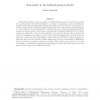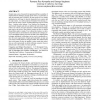112 search results - page 19 / 23 » Rounds in Communication Complexity Revisited |
TCC
2010
Springer
14 years 4 months ago
2010
Springer
We study rationality in protocol design for the full-information model, a model characterized by computationally unbounded adversaries, no private communication, and no simultanei...
CRYPTO
1994
Springer
13 years 11 months ago
1994
Springer
Suppose we are given a proof of knowledge P in which a prover demonstrates that he knows a solution to a given problem instance. Suppose also that we have a secret sharing scheme S...
CCS
2008
ACM
13 years 9 months ago
2008
ACM
Multisignatures allow n signers to produce a short joint signature on a single message. Multisignatures were achieved in the plain model with a non-interactive protocol in groups ...
NOSSDAV
2004
Springer
14 years 1 months ago
2004
Springer
Despite many years of research, fair queuing still faces a number of implementation challenges in high speed routers. In particular, in spite of proposals such as DiffServ, the st...
FC
2007
Springer
14 years 1 months ago
2007
Springer
Task-specific groups are often formed in an ad-hoc manner within big structures, like companies. Take the following typical scenario: A high rank manager decides that a task force...


